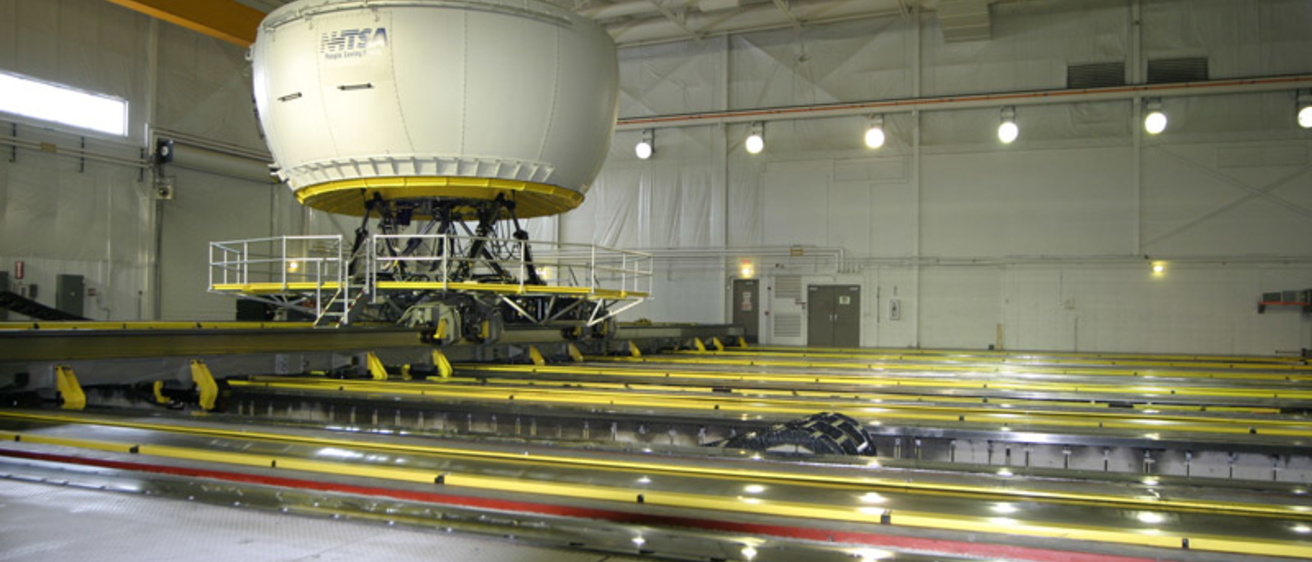Toyota’s Collaborative Safety Research Center (CSRC) has awarded the University of Iowa (UI) two of eleven projects under its sweeping new set of research programs studying the opportunities and addressing the challenges of emerging vehicle technologies. These mark the first projects launched under CSRC Next, the Center’s new five-year program that continues to support a safer transition to the future of mobility. CSRC Next research projects focus on the impact of advanced technology on broader road safety trends and the interaction between humans and machines.
The UI’s first projects under the CSRC Next program are multidisciplinary efforts between the National Advanced Driving Simulator (College of Engineering) and the Hank Virtual Environments Lab (College of Liberal Arts, Departments of Computer Science and Psychological and Brain Sciences). The UI’s projects include:
- Adaptive Headlamp System Benefit Estimation – Will measure the response characteristics and estimated benefit with respect to reduction in injury/fatalities of an adaptive headlamp system that highlights detected pedestrians and bicyclists using both driver and pedestrian/bicycle simulator studies.
- Naturalistic and Controlled Driving Studies – Transitions in Automated Driving – Study to provide a meaningful and useful dataset of driver behaviors when encountering situations where transfer of control between automation and the human is required.
“Autonomous and connected vehicle technologies are only just beginning to transform the transportation landscape,” said Chuck Gulash, Director of Toyota CSRC. “By working together with world-renowned institutions and making our results public, we are proud to help realize the promise of advanced mobility solutions and a safe, convenient transportation future.”
These UI projects are the latest in a long-standing partnership with Toyota. “We are proud of our partnerships with companies like Toyota who are constantly striving to better understand road safety and how humans and vehicles interact,” said Daniel McGehee, Director of the UI National Advanced Driving Simulator and an associate professor of mechanical and industrial engineering, emergency medicine, and public health. “Our researchers at the UI are dedicated to transforming the future of transportation and making the roads safer for everyone. Better yet, it gives our students at all levels the opportunity to participate in our cutting-edge research.”
The UI has a long history of studying automated vehicles and technologies, having conducted detailed simulator experiments on the Iowa Driving Simulator (predecessor to the National Advanced Driving Simulator) starting in 1994. These were some of the first transfer of control studies for the then FHWA Automated Highway System, seeking to understand how drivers performed when they entered and exited automated control on the highway. Since then, the UI has continued its efforts in this area, most recently conducting both simulator and on-road vehicle research around advanced technologies. Many of these studies have been collaborative efforts with other research units and departments on campus, broadening the depth of knowledge and expertise on a project.
“Collaboration is important on projects like these,” said Jodie Plumert, professor and chair of the Department of Psychological and Brain Sciences. “Multidisciplinary efforts across the UI campus create more opportunities for innovation and continue to elevate the UI’s reputation as an international leader in driving safety research.”
The UI has received funding from CSRC from its beginnings in 2011. Since its inception, CSRC has launched and completed 44 research projects with 23 partner universities, publishing more than 200 papers and presenting at multiple industry conferences. Launched in January 2017, CSRC Next builds upon the insights gained from the CSRC’s first five years and will direct $35 million towards safety research into advanced vehicle technologies, including both autonomous and connected systems. CSRC Next will continue to support ongoing research programs at the Toyota Research Institute (TRI) and Toyota Connected (TC) to help accelerate the development of autonomous and connected driving technologies and services.
The National Advanced Driving Simulator is a research unit of the UI College of Engineering’s Center for Computer-Aided Design (www.nads-sc.uiowa.edu). The Hank Virtual Environments Lab consists of faculty, staff, and students with a wide variety of interests from both the Computer Science Department and the Department of Psychological and Brain Sciences (https://psychology.uiowa.edu/hank-virtual-environments-lab).
